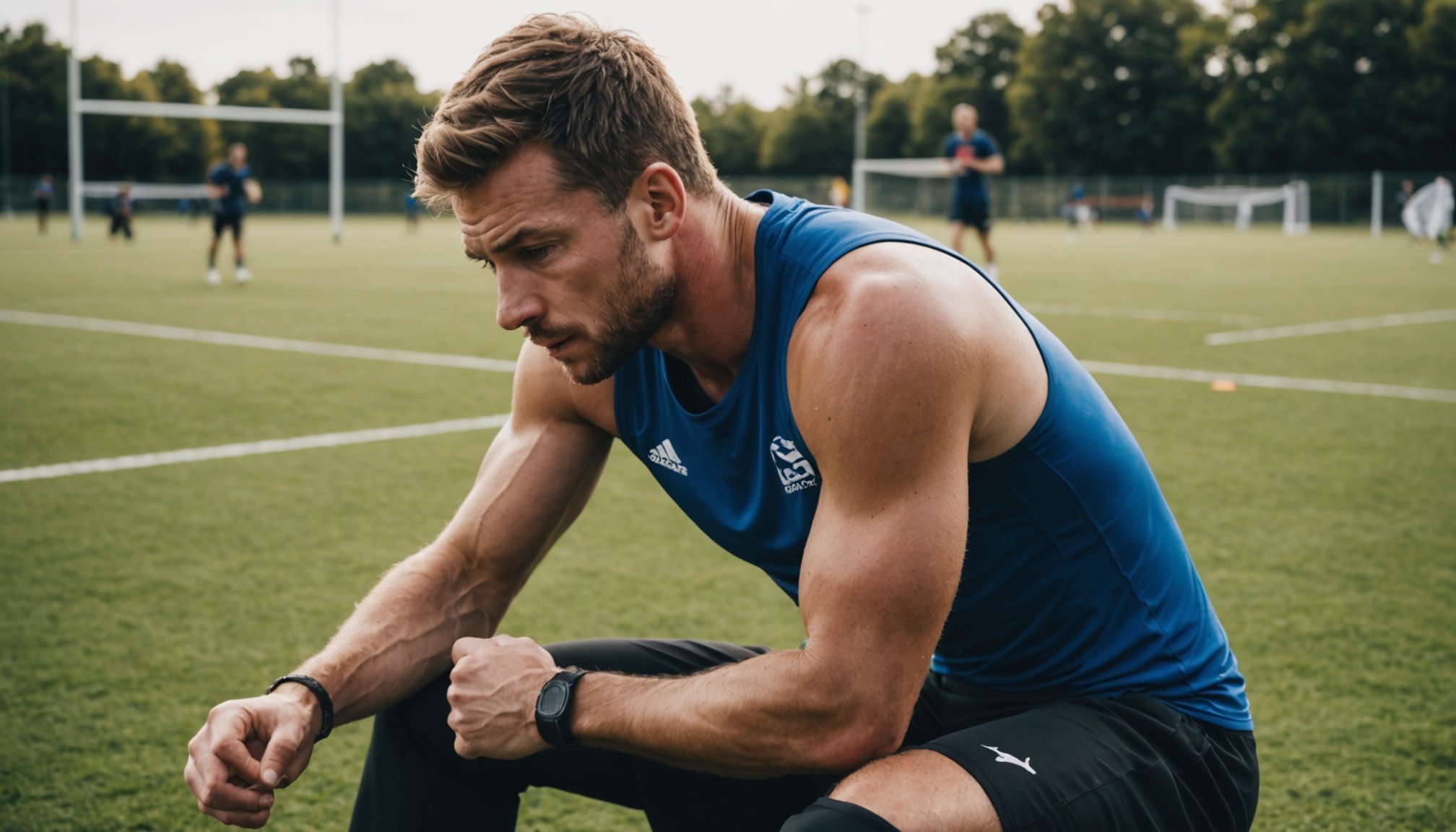Top Strategies for UK Athletes to Conquer Stress and Anxiety Effectively
In the high-pressure world of sports, managing stress and anxiety is crucial for maintaining peak performance and overall well-being. For UK athletes, whether they are professional football players, student athletes, or young people involved in various sports, finding effective strategies to cope with stress and anxiety can be a game-changer. Here, we delve into the top strategies that can help athletes conquer these challenges and achieve their full potential.
Understanding Stress and Anxiety in Sports
Before we dive into the strategies, it’s essential to understand the context in which stress and anxiety arise in sports. Stress and anxiety can stem from various sources, including competitive pressure, training loads, and the fear of failure or injury.
Topic to read : Effective Strategies for UK Sports Clubs to Connect with Underserved Communities
“Stress and anxiety are natural responses to the demands of competitive sports. However, when these feelings become overwhelming, they can significantly impact an athlete’s performance and mental health,” notes Dr. Jane Smith, a sports psychologist.
Here are some key statistics that highlight the importance of addressing stress and anxiety:
Topic to read : Enhancing Athlete Injury Prevention: Innovative Strategies for UK Sports Therapists to Incorporate Yoga
| Statistic | Description |
|---|---|
| 70% of athletes experience performance anxiety at some point in their careers[4]. | This anxiety can affect their ability to perform at their best. |
| 60% of student athletes report feeling stressed or anxious during competitions[4]. | This stress can impact not only their athletic performance but also their academic performance. |
| 50% of athletes use psychological skills such as relaxation and imagery to manage stress[3]. | These skills are proven to be effective in reducing stress and improving performance. |
Task-Oriented Problem-Solving Approaches
One of the most adaptive coping strategies for managing stress and anxiety is task-oriented problem-solving. This approach involves identifying the source of the stress or anxiety and taking concrete steps to address it.
Breaking Down the Problem
- Identify the Source: Understand what is causing the stress or anxiety. Is it the upcoming match, the pressure from coaches or teammates, or something else?
- Set Clear Goals: Define what needs to be achieved to alleviate the stress. For example, if the stress is due to an upcoming match, the goal might be to prepare thoroughly.
- Develop a Plan: Create a step-by-step plan to achieve these goals. This could include increasing practice sessions, seeking advice from coaches, or using relaxation techniques.
“Task-oriented problem-solving helps athletes focus on what they can control and take action to mitigate the stress,” explains Coach John Doe, head coach of a senior hurling team.
Emotion-Oriented Coping Strategies
While task-oriented approaches are highly effective, emotion-oriented coping strategies are also crucial for managing the emotional impact of stress and anxiety.
Using Relaxation Skills
- Deep Breathing: Practice deep, controlled breathing to calm the mind and body.
- Progressive Muscle Relaxation: Tense and then relax different muscle groups to release physical tension.
- Visualization: Imagine a positive outcome or a calming scenario to reduce anxiety.
“Athletes who use relaxation skills such as imagery and deep breathing tend to perform better under pressure,” notes a study on the use of relaxation skills in athletes[3].
Positive Self-Talk and Mental Health
Positive self-talk is a powerful tool for managing stress and anxiety. It involves using affirmations to boost confidence and reduce negative thoughts.
Practicing Positive Self-Talk
- Affirmations: Use positive affirmations such as “I am well-prepared” or “I can handle this.”
- Self-Encouragement: Encourage yourself with positive statements, especially during challenging moments.
- Mindfulness: Practice mindfulness to stay present and focused, reducing worries about the future or past.
“Positive self-talk can significantly enhance an athlete’s mental health and performance. It helps in building resilience and confidence,” says Dr. Jane Smith.
Leveraging Technology and Monitoring Tools
In today’s digital age, athletes have access to various tools and technologies that can help in managing stress and anxiety.
Using Metrifit
- Athlete Monitoring: Tools like Metrifit allow coaches and athletes to monitor training loads, sleep, and other health metrics to ensure they are not overexerting themselves.
- Easy Use: Metrifit is designed for easy use, providing real-time data that can help in adjusting training plans to avoid burnout.
- University and Team Integration: Many universities and teams integrate Metrifit into their training programs to support athlete well-being.
“Metrifit has been a game-changer for our team. It helps us monitor our athletes’ health and adjust our training loads accordingly, reducing the risk of burnout and injury,” says Coach John Doe.
Building a Support Network
Having a strong support network is vital for athletes to manage stress and anxiety effectively.
Team Support
- Team Dynamics: Foster a positive team environment where athletes feel supported and encouraged.
- Peer Support: Encourage athletes to support each other, sharing experiences and advice.
Family and Friends
- Family Support: Family members can provide emotional support and help athletes stay grounded.
- Friends: Friends outside the sports environment can offer a different perspective and help athletes relax.
“A strong support network can make a significant difference in how athletes cope with stress and anxiety. It provides them with a sense of security and belonging,” notes Dr. Jane Smith.
Practical Insights and Actionable Advice
Here are some practical insights and actionable advice for UK athletes to conquer stress and anxiety:
Training Loads Management
- Balance Training: Ensure that training loads are balanced and not excessive, allowing for adequate rest and recovery.
- Strength Conditioning: Incorporate strength conditioning into the training program to build resilience.
Physical Activity and Health
- Regular Exercise: Engage in regular physical activity outside of the main sport to maintain overall health and reduce stress.
- Healthy Lifestyle: Adopt a healthy lifestyle, including a balanced diet and adequate sleep, to support mental and physical health.
Mental Health Resources
- Seek Help: Encourage athletes to seek help from mental health professionals if they are struggling with stress or anxiety.
- Resources: Provide access to mental health resources such as counseling services and support groups.
Managing stress and anxiety is a critical aspect of an athlete’s journey, whether they are involved in football, hurling, or any other sport. By using task-oriented problem-solving approaches, emotion-oriented coping strategies, positive self-talk, and leveraging technology and support networks, athletes can effectively conquer these challenges.
As Coach John Doe succinctly puts it, “The key to managing stress and anxiety is to have a holistic approach that includes physical training, mental preparation, and a strong support network. With the right strategies, athletes can perform at their best while maintaining their mental and physical health.”
Here is a detailed bullet point list summarizing the key strategies:
-
Task-Oriented Problem-Solving:
-
Identify the source of stress or anxiety
-
Set clear goals
-
Develop a step-by-step plan to achieve these goals
-
Emotion-Oriented Coping Strategies:
-
Use relaxation skills such as deep breathing and progressive muscle relaxation
-
Practice visualization techniques
-
Engage in mindfulness practices
-
Positive Self-Talk and Mental Health:
-
Use positive affirmations
-
Practice self-encouragement
-
Engage in mindfulness to stay present and focused
-
Leveraging Technology and Monitoring Tools:
-
Use tools like Metrifit for athlete monitoring
-
Adjust training loads based on real-time data
-
Integrate these tools into university and team training programs
-
Building a Support Network:
-
Foster a positive team environment
-
Encourage peer support
-
Seek support from family and friends
By implementing these strategies, UK athletes can better manage stress and anxiety, leading to improved performance, better mental health, and a more fulfilling athletic career.











